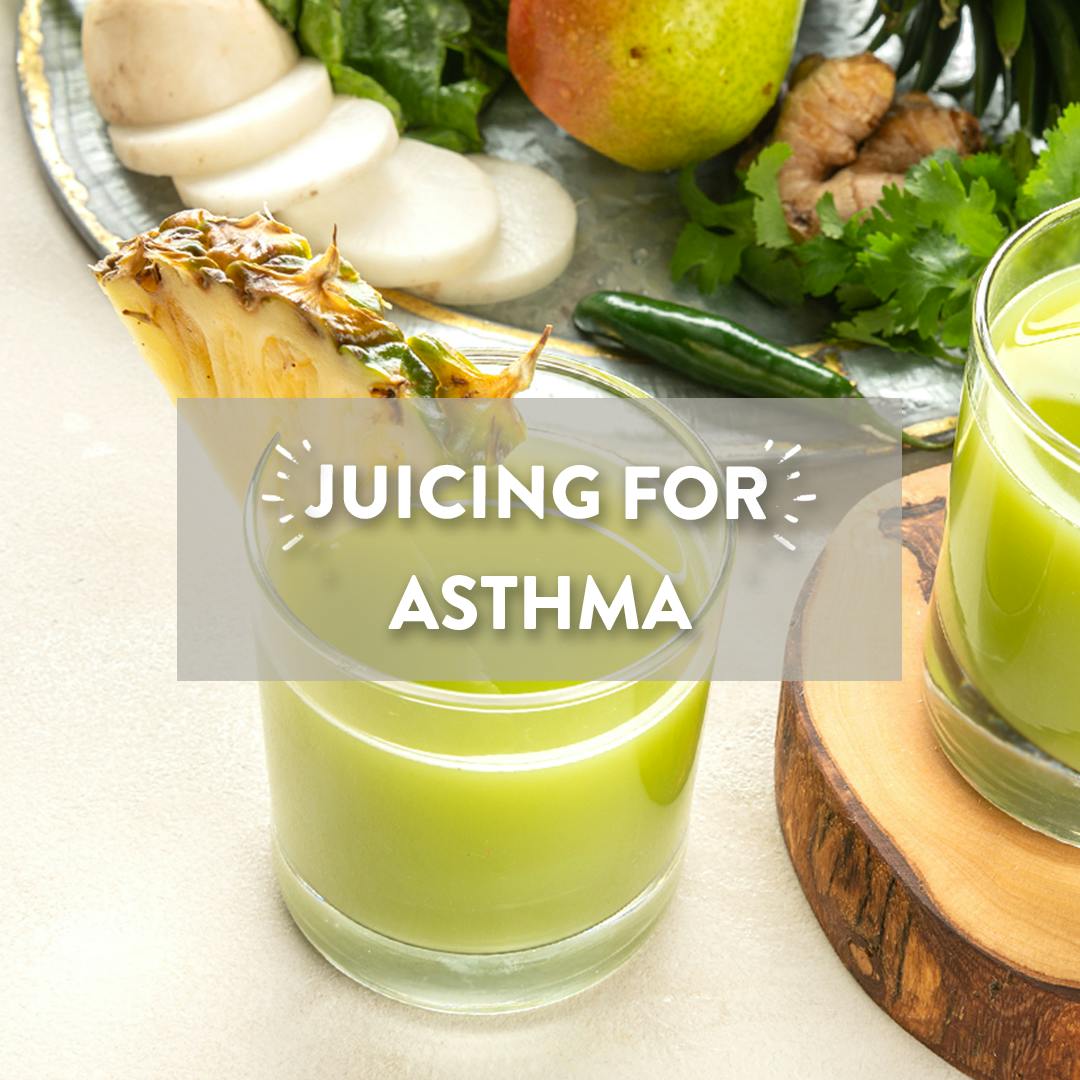What is Asthma?
Asthma is a long-term chronic condition where the airway becomes inflamed. The symptoms include difficulty breathing, tightness of the chest, wheezing and coughing.
One in 13 people in the U.S. suffer from some form of asthma, and around the world numbers vary but on average, 1 in every 12 adults and 1 in every 11 children are currently receiving treatment for asthma.
Juicing for Asthma
Juicing for asthma is only complicated if you make it complicated. The best part of juicing is that it allows you to experiment with combinations and recipes using fresh produce. You will soon learn which ingredients provide the relief you're seeking and help you live a healthy lifestyle.
And as a bonus, most of the nutrients that bring asthma relief have other health benefits as well.
Cold-pressed or homemade juices are best because the process lets you maintain all the nutrients, and you have the option of leaving all or some of the pulp in the juice to benefit from the fiber content of the skin.
In contrast, pasteurizing juices involves very high temperatures that destroy most of the nutrients, and all the fiber is removed before bottling.
Talking about juicing for asthma does not mean you should replace your medication, and it's always best to discuss it with your healthcare provider. While OTC medications may be beneficial and necessary, studies have indicated that the power of fresh juices can help slow down, or even eliminate asthma-related allergy triggers.
What to Look for in Fresh Produce When Juicing for Asthma
Asthma involves inflammation and allergies, both of which can be minimized by what you eat and drink. Nutrients including vitamins C, A, D, E, and B vitamins, as well as selenium, fiber, and certain types of fats, can all play a role in asthma management.
Juicing is an excellent way to deliver the essential nutrients from fruits and vegetables in an unharmed or unprocessed way to the body. Raw fruits and vegetables yield the purest form of nutrients.
Exposing them to high heat can destroy or decrease the vitamins, enzymes, and minerals in the ingredients you use.
Here is a list of nutrients to look out for when picking fresh fruit and vegetables for juicing to help you manage asthma symptoms.
Research indicates juicing is the easiest way for the body to absorb vitamins A, C, and D, omega-3, folate, zinc, and other phytonutrients from raw fruit and vegetables. These are the main nutrients you need for management of asthma:
- Antioxidants: Antioxidants like vitamin C, vitamin E, and beta-carotene can help reduce oxidative stress and inflammation in the airways.
- Vitamin D: Vitamin D may help reduce the severity of asthma attacks.
- Vitamin K: Vitamin K helps protect lung health and may regulate inflammation.
- B-Vitamins: A B vitamin collective includes folate (vitamin B9), vitamin B6, and vitamin B12 are important in their ability to reduce incidences of asthma, and improve lung function and play a role in reducing allergic reactions and inflammation.
- Vitamin A: Vitamin A is important for maintaining healthy lung tissue. Research suggests that taking in higher amounts of vitamin A during childhood is associated with better lung function and a lower risk for an asthma diagnosis in adolescents.
- Magnesium: According to medical experts, magnesium is a mineral essential for lung function as it relaxes inflamed bronchial muscles, helping air to flow efficiently.
- Quercetin: Quercetin is a flavonoid with anti-inflammatory properties that is naturally found in many fruits and vegetables. It has been shown to reduce bronchial hyperactivity, airway inflammation, and mucus production, which are the major symptoms of asthma.
- Omega-3 Fatty Acids: The National Heart, Lung and Blood Institute (NHLBI) says the goal of asthma management is to achieve control with an asthma action plan that includes monitoring, and avoiding triggers. According to a study published in Nutrients, having a higher Omega-3 Index is associated with better asthma control.
Best Ingredients for Asthma-Friendly Juice Recipes
Again, these ingredients will not cure asthma or prevent incidents entirely. This is a list of fresh fruits and vegetables, and the nutrients they contain that may benefit lung health and help you manage asthma-related allergies.
Pineapple: Pineapples, including the hard core in their center, contain bromelain. Bromelain is an enzyme that may have a therapeutic effect on asthma. The journal Evidenced-Based Complementary and Alternative Medicine highlighted the outcome of a study that investigated the properties of bromelain to reduce allergic sensitization and stop development of other airway-infecting inflammatory responses.
Citrus: Vitamin C rich oranges, lemons, limes, and grapefruit have antioxidants that fight off allergens and free radicals while also boosting the immune system. Citrus juices have been shown to reduce exercise-induced asthma attacks because the high water content of citrus fruits can help contribute to hydration.
Lemons: Although part of the citrus fruit range, lemons have traditionally been used as an antiseptic and as a treatment for respiratory problems. The antiseptic properties of lemons can help destroy bacteria and prevent mucus buildup, and the citric acid content cleans and strengthens lung tissue.
Apples: Apple juice contains phytochemicals such as flavonoids and phenolic acids that are believed to improve pulmonary health, calm inflammation in the airway, and reduce the effects of asthma. This was confirmed by research conducted by The National Heart and Lung Institute. One of these phytochemicals is quercetin, which is mainly found in the skin of apples, so, to make the best of what apples offer, it's a good idea to keep some skin and pulp in your apple juice.
Pomegranates: Pomegranate Juice offers a healthy dose of antioxidants that may help reduce inflammation in the lungs. According to the Nutrients review, fruits and vegetables rich in antioxidants can help lower inflammation in the airways.
Watermelon: Watermelon is loaded with lycopene, a type of carotenoid shown to be particularly effective at controlling exercise-induced asthma. Along with lycopene, watermelon juice contains plenty of beta-carotene, vitamin C, potassium, and magnesium.
Sweet cherries: Sweet cherries provide a hearty dose of vitamin C, an important anti-asthma nutrient. They are also rich in anthocyanins, which are flavonoid pigments in red fruits, shown to have anti-inflammatory properties that inhibit lung inflammation.
Pears: There is ample evidence suggesting that pears can provide increased protection against asthma. Among many nutrients in pears, they are antioxidant rich and are packed with soluble fiber.
Berries: Berries include strawberries, blueberries, blackberries, elderberries, raspberries, goji berries, mulberries and currants. These berries are loaded with valuable dietary fiber and antioxidants that keep inflammation in check. In addition, berries contain natural colorants with therapeutic power called anthocyanins.
Ginger: Fresh ginger root contains gingerols, shogaols, and zingerones, the nutrients to which ginger’s bronchodilation properties are attributed. It is suggested that these compounds have particular anti-inflammatory and analgesic properties, which are comparable to the properties of non-steroidal anti-inflammatory drugs (NSAIDs). According to one study, an active component in fresh ginger root may help relieve asthma symptoms by relaxing the airway.
These flavonoids are found in all fruit and vegetables that are naturally red, purple or blue. Not only do they have anti-inflammatory and antibacterial properties, anthocyanins and flavonoids also play an important role in scavenging free radicals and reducing the oxidative stress.
Beets: Beets are a root vegetable known for their rich red color and sweet, earthy flavor. They are high in antioxidants, fiber, and nutrients such as potassium and folate. Beet juice is also high in nitrates, which can help improve blood flow and oxygenation to the lungs.
These circulatory benefits can limit symptoms of conditions such as asthma. Furthermore, the rich red color of beets indicates the presence of anthocyanins, a powerful flavonoid with anti-inflammatory and antibacterial properties.
Carrots: Carrots are rich in antioxidants like beta-carotene and vitamin C to fight inflammation and help protect the airway, respiratory cells, and fluids from oxidative stress and damage. Furthermore, carrot juice is high in vitamin A, a fat-soluble micronutrient critical to the formation of alveoli, the tiny air sacs of the lungs where gas exchange takes place.
Tomatoes: While low in calories, tomato juice is known for being packed with beneficial antioxidants. A study on the effect of fruit and vegetable consumption on the prevalence of asthma found that a diet rich in tomatoes has beneficial health effects. This suggestion is linked to the rich lycopene content in tomatoes, which is an antioxidant believed to help promote bronchodilation, making it easier to breathe.
Cruciferous vegetables: The cruciferous family is a group of plants that include a range of leafy green vegetables and root vegetables. Examples include broccoli, bok choy, Brussels sprouts, cauliflower, cabbage, Collard/spring greens, kale, horseradish, kohlrabi, mustard, rocket, radish, turnip, wasabi, and watercress.
Green juices made from cruciferous vegetables contain many vitamins and minerals, and are also a great source of omega-3 fatty acids. Furthermore, in a recent study, researchers from the Francis Crick Institute in London have found that certain molecules naturally found in cruciferous vegetables can boost the activity of a protein that helps the lungs maintain a healthy barrier against viral and bacterial infections that include asthma
Spinach: Although spinach is one of the many leafy greens to include in healthy juices, it deserves a separate mention. Along with loads of vitamins and minerals, spinach also contains vitamin B9, or folate. According to the NIH, folate could be especially important for people with asthma.
Researchers have found that kids who didn’t get enough folate and vitamin D were about 8 times more likely to experience one or more severe asthma attacks than kids who consumed enough of both folate and vitamin D.
Many of these juice ingredients are also recommended for managing allergies.
Final Thoughts
In summary, adding fresh fruits and vegetables to your daily juicing routine can help you manage asthma and the asthma-related triggers. The abundance of natural ingredients like vitamins, minerals, antioxidants, and anti-inflammatory compounds can be invaluable for lung health. Whether it's the vitamin C found in oranges, the bromelain in pineapples, or the quercetin in apples, these elements can work together to reduce inflammation, enhance immune function, and promote better respiratory health.
By making fresh fruit and vegetable juices a regular part of your diet, you can take steps to manage asthma effectively and live a healthier life. But it's important to talk to a healthcare professional to make sure that the juicing and ingredients fit with your plan for managing asthma and meets your dietary needs.



Rate and Comment